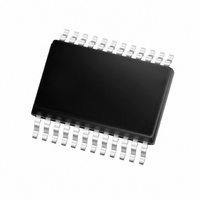MCP3909-I/SS Microchip Technology, MCP3909-I/SS Datasheet - Page 100

MCP3909-I/SS
Manufacturer Part Number
MCP3909-I/SS
Description
IC POWER METERING-1 PHASE 24SSOP
Manufacturer
Microchip Technology
Datasheets
1.MCP3909T-ISS.pdf
(44 pages)
2.MCP3909T-ISS.pdf
(104 pages)
3.MCP3909-ISS.pdf
(40 pages)
Specifications of MCP3909-I/SS
Package / Case
24-SSOP (0.200", 5.30mm Width)
Input Impedance
390 KOhm
Measurement Error
0.1%
Voltage - I/o High
2.4V
Voltage - I/o Low
0.85V
Current - Supply
2.3mA
Voltage - Supply
4.5 V ~ 5.5 V
Operating Temperature
-40°C ~ 85°C
Mounting Type
Surface Mount
Meter Type
Single Phase
Operating Temperature Range
- 40 C to + 85 C
Mounting Style
SMD/SMT
Supply Voltage Range
4.5V To 5.5V
Digital Ic Case Style
SSOP
No. Of Pins
24
Interface Type
Serial, SPI
Supply Voltage Max
5.5V
Rohs Compliant
Yes
Lead Free Status / RoHS Status
Lead free / RoHS Compliant
For Use With
MCP3909EV-MCU16 - EVALUATION BOARD FOR MCP3909MCP3909RD-3PH1 - REF DESIGN MCP3909 3PH ENGY MTR
Lead Free Status / Rohs Status
Lead free / RoHS Compliant
Available stocks
Company
Part Number
Manufacturer
Quantity
Price
Part Number:
MCP3909-I/SS
Manufacturer:
MICROCHIP/微芯
Quantity:
20 000
MCP3909 / dsPIC33F 3-Phase Energy Meter Reference Design
DS51723A-page 100
Since the phase lag of a CT's output signal is related to the magnitude of current,
different correction coefficients, K, can be set according to different RMS current
values. In this design, 5 calibration points can be set. If it does not require high-preci-
sion, fewer points can be set to simplify calibration.
If one-time calibration cannot meet the precision requirement, more calibrations can be
done. The new angle error may still be calculated using Equation C-72. The new
correction coefficient is:
EQUATION C-74:
EQUATION C-75:
C.16.0.1 PHASE LAG COMPENSATION WHEN FREQUENCY VARIES
For the same current intensity, the signal delay caused by the CT is the same. When
the frequency of the input signal varies, the phase lag will be different. Normally,
calibration is done at 50 Hz. When the frequency varies, if the same phase lag
compensation coefficient for 50 Hz is still used, it will cause an error in the power
measurement. In most cases, the frequency varies in a small range (test specification
requires ±2.5%), so it has little effect on the measurement accuracy. For meters with
an accuracy of 0.5s or above, this measurement error can be ignored. But for 0.2s
meters, the error cannot be ignored and the frequency variation needs to be corrected
during calculation.
The phase lag compensation coefficient k
Assuming that the freqnency is 50 Hz, the signal delay caused by CT is t, then after
correction, the compensation coefficient k
EQUATION C-76:
EQUATION C-77:
When frequency varies, assuming that the frequency offset is Δf, i.e. the input signal
frequency is 50 + Δf, then the compensation coefficient will be:
EQUATION C-78:
EQUATION C-79:
k'
k'
1
2
=
=
cos
k'
sin
k'
1
2
(
(
k
=
k
=
Δϕ
Δϕ
1
2
cos
=
sin
=
1
1
+
+
cos
Δϕ
Δ
sin
Δϕ
Δϕ
ϕ
Δϕ
Δ
=
=
2
2
ϕ
)
)
cos
sin
=
=
=
=
1
1
and k
and k
k
(
k
cos
sin
(
2
t
1
t
⋅
⋅
⋅
⋅
(
(
(
(
cos
cos
t 50 2
50
t 50 2
50
⋅
2
2
⋅
+
Δϕ
Δϕ
are corrected during calculation.
will be:
+
Δ
⋅
⋅
Δ
2
2
f
f
–
) 2
–
π
) 2
π
⋅
)
⋅
k
k
)
1
2
π
π
⋅
⋅
© 2009 Microchip Technology Inc.
)
)
sin
sin
Δϕ
Δϕ
2
2













